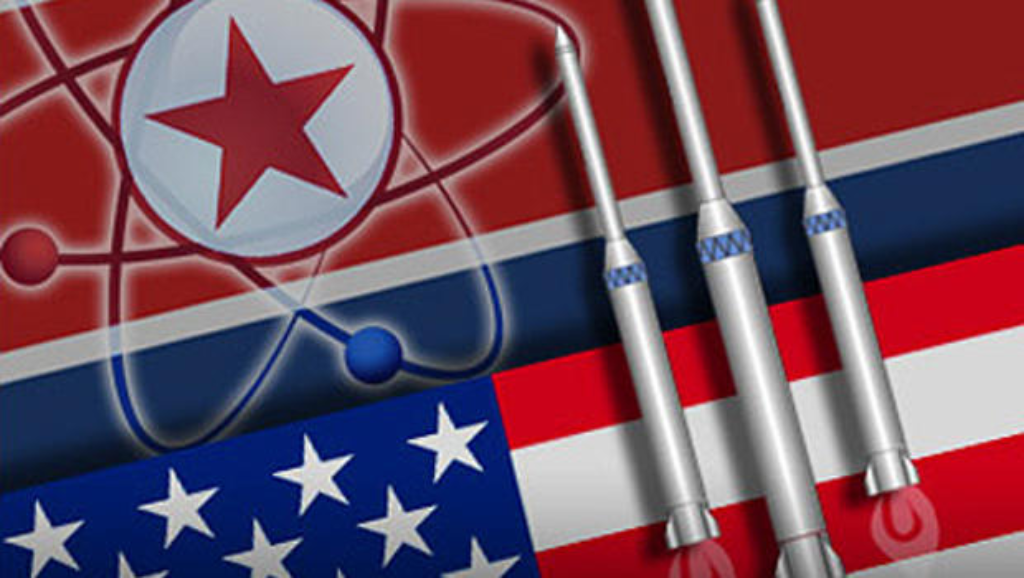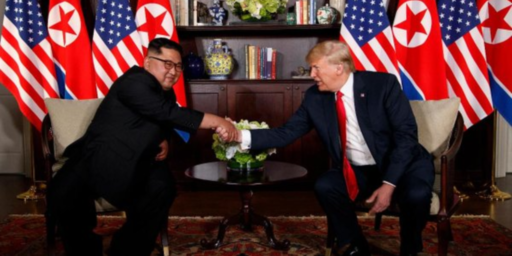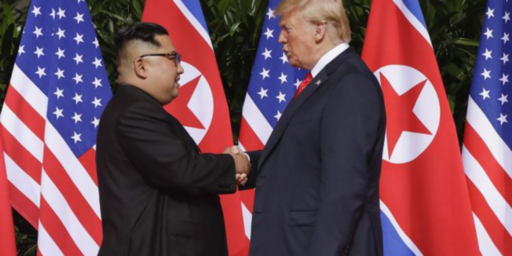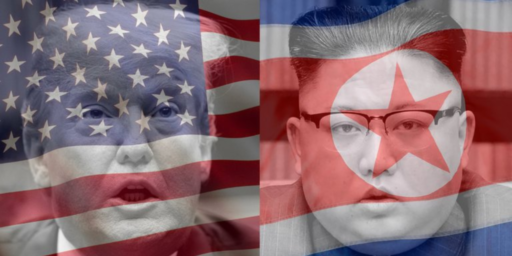U.S. Ready To Give Up ‘Denuclearization’ In North Korea Talks?
Is the United States finally ready to give up on the fantasy that North Korea will surrender its nuclear weapons?

In the wake of yesterday’s meeting between President Trump and Kim Jong Un, The New York Times has an interesting report this morning suggesting that the Trump Administration may be ready to give up the idea of an immediate commitment to denuclearization on the part of North Korea in new talks with DPRK negotiators that appear to be back on schedule:
SEOUL, South Korea — From a seemingly fanciful tweet to a historic step into North Korean territory, President Trump’s largely improvised third meeting on Sunday with Kim Jong-un, the North Korean leader, was a masterpiece of drama, the kind of made-for-TV spectacle that Mr. Trump treasures.
But for weeks before the meeting, which started as a Twitter offer by the president for Mr. Kim to drop by at the Demilitarized Zone and “say hello,” a real idea has been taking shape inside the Trump administration that officials hope might create a foundation for a new round of negotiations.
The concept would amount to a nuclear freeze, one that essentially enshrines the status quo, and tacitly accepts the North as a nuclear power, something administration officials have often said they would never stand for.
It falls far short of Mr. Trump’s initial vow 30 months ago to solve the North Korea nuclear problem, but it might provide him with a retort to campaign-season critics who say the North Korean dictator has been playing the American president brilliantly by giving him the visuals he craves while holding back on real concessions.
While the approach could stop that arsenal from growing, it would not, at least in the near future, dismantle any existing weapons, variously estimated at 20 to 60. Nor would it limit the North’s missile capability.
The administration still insists in public and in private that its goals remain full denuclearization. But recognizing that its maximalist demand for the near-term surrender of Mr. Kim’s cherished nuclear program is going nowhere, it is weighing a new approach that would begin with a significant — but limited — first step.
American negotiators would seek to expand on Mr. Kim’s offer in Hanoi in February to give up the country’s main nuclear-fuel production site, at Yongbyon, in return for the most onerous sanctions against the country being lifted. Mr. Trump, under pressure from his secretary of state, Mike Pompeo, and his national security adviser, John R. Bolton, rejected that proposal, because so much of the North’s capability now lies outside the vast Yongbyon complex.
The idea now is to get Mr. Kim’s new negotiating team to agree to expand the definition of the Yongbyon site well beyond its physical boundaries. If successful — and there are many obstacles, including the North accepting intrusive, perhaps invasive inspections — it would effectively amount to a nuclear freeze that keeps North Korea from making new nuclear material.
But a senior United States official involved in North Korean policy said there was no way to know if North Korea would agree to this. In the past, he said, its negotiators have insisted that only Mr. Kim himself could define what dismantling Yongbyon meant.
To make any deal work, the North would have to agree to include many facilities around the country, among them a covert site called Kangson, which is outside Yongbyon and is where American and South Korean intelligence agencies believe the country is still producing uranium fuel.
A president embarking on a re-election campaign — and who complained repeatedly on Sunday that he receives no credit from the media for de-escalating tensions with North Korea and for the freeze on underground nuclear tests and test-launches of intercontinental ballistic missiles — would most likely cast this as a victory, as another restraint on Mr. Kim. It would help Mr. Trump argue that he is making progress, albeit slowly, on one of the world’s most intractable crises.
And it would be progress after three face-to-face meetings — first in Singapore a little more than a year ago, then in Hanoi, then in an hourlong discussion at the DMZ on Sunday — that have produced warm exchanges but no shared definitions of what it meant to denuclearize the Korean Peninsula. A year after that first meeting, the North has yet to turn over an inventory of what it possesses, claiming that would give the United States a map of military targets.
(…)
Presumably, Mr. Trump’s freeze would have to be a permanent one, or he will have gotten less from Mr. Kim than President Barack Obama got from Iran in a deal Mr. Trump dismissed as “disastrous.” And even a successful freeze would constitute a major retreat from the goal of the “rapid denuclearization of North Korea, to be completed by January 2021,” as Mr. Pompeo put it last fall.
But it does have the benefit of being vastly more achievable.
More than two years ago, on his first trip to Seoul, Secretary of State Rex W. Tillerson rejected a similar idea. He said it would “leave North Korea with significant capabilities that would represent a true threat, not just to the region, but to American forces, as well.”But Mr. Trump, who prizes his personal relationship with Mr. Kim, would most likely argue that a freeze was groundbreaking. (He has also described Mr. Tillerson, who he dismissed early in 2018, as “dumb as a rock” so he would most likely not be limited by his past declarations.)
If this report is accurate, and it’s worth noting that National Security Adviser John Bolton is denying that it is on Twitter, then it could mean that the Trump Administration is finally willing to acknowledge reality with regard to the negotiations with the DPRK that have been taking place ever since tensions on the peninsula began cooling down at the beginning of 2018. From that time until now, the Trump Administration has maintained that its goal in the talks with North Korea is an agreement that results in the DPRK giving up its nuclear arsenal and its entire nuclear research program.
As I noted even before these U.S.-North Korean negotiations began last year, that is quite simply an unrealistic and, for the time being, an unachievable goal that will guarantee that negotiations will fail. After the Singapore Summit, President Trump claimed that North Korea was no longer a nuclear threat and his Administration claimed that Kim had agreed that the goal of future negotiations would be denuclearization along the lines that the United States was demanding. Very quickly after what amounted to a photo opportunity summit that had produced nothing in terms of substance, though, it became clear that this was not the case.
Just two weeks after the summit, for example, it was reported that North Korea was increasing production of the fuel needed to make additional nuclear weapons and that it was concealing the existence of ongoing nuclear weapons research at secret facilities well hidden from both surveillance and, most likely, the ability of the United States to take the sites out in a military strike. Additionally, it became apparent in the days after the summit that the much-publicized destruction of the DPRK’s primary nuclear weapons test site, a much-hyped pre-summit event that was witnessed by American and other international journalists was much less than met the eye and that the site could easily be rebuilt if needed in the future. Weeks later, we learned that the DPRK had also begun work on the construction of new ballistic missiles at yet another secret site. Additionally, analysts who have seen satellite images say that the DPRK has made a second large nuclear reactor operational. This type of reactor is capable of making plutonium which is, of course, one of the main fuels used in the production of nuclear weapons. This new reactor can reportedly make four times as much plutonium as North Korea’s current reactor, which has been the source for the plutonium needed for its nuclear arsenal to date. Finally, as recently as September it was reported that North Korea was continuing to develop nuclear weapons at secret sites that may or may not be known to American intelligence. Obviously, these are not the actions that one would expect from a nation that had agreed to “denuclearization” in the sense of giving up their existing nuclear weapons program and existing arsenal of weapons.
In addition to this, it has been apparent for some time, that the United States and North Korea are talking about two fundamentally different things when they talk about the idea of denuclearization. When the United States talks about “denuclearization,” it is principally referring to the idea that the goal of these current talks, indeed perhaps the only goal, is for the DPRK to give up its nuclear weapons, its weapons research program, and its ballistic missile program. Leaving aside the fact that the regime in Pyongyang is unlikely to do this simply because the existence of the nuclear arsenal they do have is perhaps the best deterrent available to guarantee the survival of the regime, this stands in stark contrast to what the North Koreans mean when they talk about “denuclearization.” For them, it means the removal of all American troops from South Korea if not the entire region, including Japan, and the lifting of the so-called nuclear umbrella that the United States has in place which essentially reserves the right to use nuclear weapons in response to any attack on its allies in Seoul, Tokyo, or elsewhere in the region. The North Koreans made this clear as recently as December and again in January of this year, but the Administration appears to have not gotten the message.
As I have said before, there are things that could be accomplished if both the United States and North Korea approached these negotiations realistically. In that regard, the idea that the Administration might be willing to accept something short of full denuclearization could arguably be a step in the right direction. Tensions on the Korean peninsula, which have been on a razor’s edge since the end of the Korean War and ramped up significantly last year during the tit-for-tat exchanges that took place between President Trump and the North Korean leader, have calmed down significantly this year and making that more permanent would be a good thing. Additionally, more formal negotiations aimed at bringing the Korean War to a formal end should be pursued, as should agreements designed to ease the conventional arms standoff across the Demilitarized Zone. However, as I have noted before (see here and here), if the United States continues to insist that the ultimate goal of these talks is the idea that North Korea will give up its nuclear arsenal, then these talks are doomed to fail.
This report in the Times is, perhaps, a sign that the United States may be willing to give up on the unachievable for now goal of denuclearization. If that’s the case then maybe, just maybe, these future talks might have a chance at succeeding.





NoKo was always going to keep their nuclear weapons.
So our incredible deal-making President granted them legitimacy on the world stage, in order to let them keep their nuclear weapons? We have given them everything they want…including now, a visit to the North by an American President and an invitation to the White House.
All so they can keep their nuclear weapons.
Brilliant.
It may be inevitable to recognize North Korea as a nuclear-armed state, but it is also inevitably a terrible idea to do so. For one thing, it tells other nations antagonistic to the US they’re home free if they develop nukes. For another, it weakens the notion of non-proliferation. For good measure, lifting sanctions for some kind of deal, would look like a reward for developing nukes.
But if it does happen, then it’s better it happen under a Republican.
@Kathy:
And we can be quite certain Iran is listening.
@Mikey:
That’s the thing…the inconsistency is counter-productive. Iran knows it can go on processing fuel, and just wait it out.
North Korea has the advantage, so to speak, of being able to cover South Korea’s capital with conventional artillery (including short range conventional missiles), which makes any war in the peninsula unappetizing.
Iran can cause a temporary disruption in global oil supplies, which is a very big thing, but not for long and without inflicting lasting consequences. They can also, perhaps, launch terror attacks on the West, particularly on Israel. These can cause lasting damage, but on a relatively small scale compared to the mass shelling of Seoul.
Therefore a preemptive attack on Iran is seen as a possibility, while one on North Korea is not.
Still, if the Mullahs test a nuke, they’re 90% home free.
I tend to think the report probably was accurate and this was just Bolton’s effort to try and scuttle it. Which leads me to ask, has been an administration in the last 50 years (or more) where the President’s top advisors are so in routine public conflict with his verbally (or tweetedly) expressed policies?
What @Daryl and his brother Darryl: said. Kim gets everything he’s ever wanted, we get fuck-all. Because the Great Dealmaker. Ever so much better than that black president who also got nothing, but paid nothing for it.
As with NAFTA, Trump is accepting the status quo and declaring it a victory.
When we helped toppled Kadafi in Libya, that cast the die on North Korea and Iran. Kadafi had done what we wanted — got rid of his WMDs. And then we helped topple and kill him. The rest of the world learned the lesson: don’t give up your WMDs. It’s the only thing keeping you in power.
And what would we do if we wanted them not to be home free? Nuke them”til they glow”? Frankly, if you think that “the mullahs” having nukes is that dangerous, the above solution is the only arrow in the quiver. Nothing else will guarantee the outcome you want.
As a personal matter, I’m up for that solution. It’s part of the reason the nation hasn’t elected an abyss (until recently, that is).